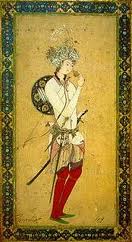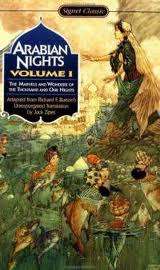The Real Caliph
 When I decided to set the Dabir and Asim stories in historical Arabia, I likewise decided that while I would emulate the real world, I’d also pay homage to the 1001 Nights. I would emphasize glitter over grit, although the latter wouldn’t be entirely absent. There would naturally be elements of the fantastic, although they would not be everyday experiences.
When I decided to set the Dabir and Asim stories in historical Arabia, I likewise decided that while I would emulate the real world, I’d also pay homage to the 1001 Nights. I would emphasize glitter over grit, although the latter wouldn’t be entirely absent. There would naturally be elements of the fantastic, although they would not be everyday experiences.
There are not just fantasy figures in the 1001 Nights, there are also real historical characters, like the caliph Harun al-Rashid and his vizier Jaffar. Dabir and Asim start out working for Jaffar, and rise to such prominence that they begin to interact with the caliph, one of the most powerful men in the world.
I have had more and more reason to be thinking about Harun as I advance into the writing of the third Dabir and Asim book. He makes a few appearances in The Desert of Souls, and is off-stage through The Bones of the Old Ones, but he is a central character in The Maiden’s Eye. I show him as he is in the 1001 Nights, where he comes across as a pretty compelling figure. In real life, though… he was kind of a tractless jerk.
The caliphate could have done a lot worse than Harun al-Rashid, and did, but it surely might have done better. The first part of his rule, dominated as it was by the Barmakid family that provided his viziers – the people who actually ran his country – saw the introduction of the first paper mill to the caliphate, not to mention an economic and scientific and literary renaissance. Things began to slide a little after the caliph brutally finished the family off, for reasons he never fully explained.
 Harun spent a lot of his time loving the women in his expansive harem, and seeking more, although he also sought spiritual salvation, and made numerous pilgrimages to Mecca. He could be insightful and even generous, although he might also brood for days over perceived slights. He could rise to great anger on a whim and plan to kill a man, only to be won over by the fellow’s brilliance or piety. In short, while clearly perceptive, he was possessed of a changeable nature and was, for all intents and purposes, a self-involved hedonist. He’s interesting in a train wreck kind of way, but I did not want his character to be the dominating feature of the Dabir and Asim stories.
Harun spent a lot of his time loving the women in his expansive harem, and seeking more, although he also sought spiritual salvation, and made numerous pilgrimages to Mecca. He could be insightful and even generous, although he might also brood for days over perceived slights. He could rise to great anger on a whim and plan to kill a man, only to be won over by the fellow’s brilliance or piety. In short, while clearly perceptive, he was possessed of a changeable nature and was, for all intents and purposes, a self-involved hedonist. He’s interesting in a train wreck kind of way, but I did not want his character to be the dominating feature of the Dabir and Asim stories.
The 1001 Nights gives us a caliph who seems more suited as the hand on the tiller of a city in the midst of a golden age. He is just, and clever, and likes to have a little fun by wandering the streets of his great metropolis in disguise, seeking adventure. He is the sort of man we wish could lead and perhaps that is why, centuries after his death, he turned up being portrayed in this way in the 1001 Nights.
And so, because I deliberately set out to emulate the feel of The Arabian Nights, and because I want Dabir and Asim to be the center of their tales, and perhaps most of all because I have a soft spot for wise rulers (of whom the world has seen so few), the Harun al-Rashid of these novels is the fictional man, not the real one.
3 Comments